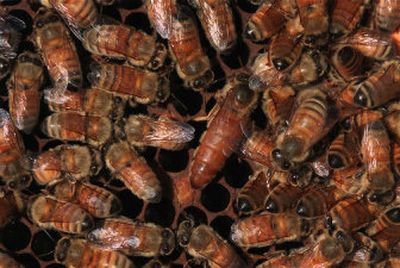What keeps bees busy?

In our summer gardens the buzzing of honey bees has an almost musical, even hypnotic, quality. I know more than one person who has dozed off in a lawn chair to their droning. That’s the way the lazy days of summer should be.
But ask Jerry Miller and other members of the Inland Empire Beekeepers Association about all that buzzing and you learn that honey bees are a very important insect in the garden. So important that they make a huge difference in how we live and what we eat.
In an effort to help people understand just how important they are, the beekeepers, in cooperation with the cooperative extension offices in Spokane and Kootenai counties, will be hosting two workshops about bees and beekeeping in Spokane and Coeur d’Alene.
Honey bees’ seemingly simple act of foraging for nectar to make honey and feed their hive is actually one of the most efficient and important methods of pollination ever devised by nature. The act of collecting nectar also collects pollen which the bee carries from flower to flower. When they do so, they create the abundance of flowers, fruits and vegetables we enjoy from our gardens and the grocery store.
“They are responsible for the pollination of about one third of our produce in this country,” says Jerry Miller, a member of the Inland Empire Beekeepers and coordinator for the Spokane County workshop. “If we didn’t have them, we would have really high prices for produce and some things wouldn’t even be available.”
But honeybees have been serious decline for the past 20 years. According to Miller, several parasites, insects and diseases have been attacking bees and their hives killing off huge numbers of bees. Miller has heard reports that last winter alone, as many as 50 percent of the honey bees in the United States were killed by mites. “The indiscriminate use of pesticides by human beings hasn’t helped either,” said Miller. “(Pesticides) have killed a lot of beneficial insects including honey bees.”
The workshops
•The Coeur d’Alene seminar will be on Jan. 14 at the University of Idaho Kootenai County Extension Office. This day-long series of classes is designed for both the experienced beekeeper and those who just want to know more about these marvelous insects. Four local beekeepers will present classes on the biology of the bee, general beekeeping information, honey collecting and grading and hive component construction.
The class will be from 9 a.m. to 4 p.m. at the UI Kootenai County Extension Office, 1000 W. Hubbard, Suite 140 in Coeur d’Alene. There is a fee of $5, plus a small fee for additional materials. Pre-registration and pre-payment is required. Contact the office at the above address or by phone at (208) 446-1693. Registration deadline is Wednesday.
•The Spokane workshop will run Friday evenings, Jan. 13 through March 17. This will be a more in-depth series of classes intended for those who want to become beekeepers, or those who are already beekeepers but want more information. Completion of the series of workshops will qualify attendees for certification as a beekeeper by the Washington State Beekeepers Association.
Classes will be taught by Jim Miller, experienced members of the Inland Empire Beekeepers Association and invited instructors. Miller (no relation to Jerry Miller) is one of the few Master Beekeepers in Washington and recently returned from the country of Georgia, where he helped set up beekeeper training programs.
Workshop topics will cover bee biology and hive behavior; queen management; hive and beekeeping equipment; hands-on construction of hive boxes, frames and foundations; flower selection for bees; spring and fall hive management; honey extraction, grading and marketing; and pest management.
The workshop will be from 6 to 7:30 p.m. at the WSU Spokane County Cooperative Extension Office, 222 N. Havana St. Cost is $30 per person or $40 per family from the same address. Text for the class will be an additional $25, due the first night of class. Certification as a beekeeper is an additional $10. Pre-registration and pre-payment is required; contact the office at the above address or by phone at (509) 477-2048.